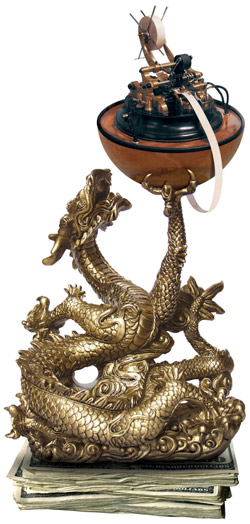Red-Flagging China: Regulators Eye Chinese Companies Using Reverse Mergers to Enter US

Illustration by Viktor Koen
There’s more than one way for a company to get listed on U.S. public exchanges. The most traditional is the initial public offering, where a private company works with an underwriter to determine what type of security to issue, the best offering price and when to bring it to market.
But there’s a backdoor way to U.S. equity: a reverse merger, whereby a private company is acquired by a publicly traded company, often a defunct concern with negligible operations and assets. The public company turns operations and control over to the acquired company’s board, which can then issue equity.
It’s an attractive alternative to IPOs because reverse mergers—also called reverse takeovers—require fewer legal and accounting fees, so they are faster and less expensive. And they do not require registration under the Securities Act of 1933, so they receive less regulatory scrutiny than IPOs.
FRAUD ON THE RISE
Although a legitimate method of going public, reverse mergers are also prone to fraud and abuse, particularly by foreign companies seeking American markets. Regulators and legal experts have lately been eyeing China-based companies, which have increasingly used reverse mergers to access U.S. capital markets.
Regulators have found that despite pumped-up stock prices, some China-based companies that completed reverse mergers lack employees, customers or contracts, are woefully short of revenue, and have a fraction of the cash on hand that had been reported.
As a result, some Chinese companies have been subject to trading suspensions, revoked securities registration and shareholder class actions. For example, the Securities and Exchange Commission took action this year against China Changjiang Mining & New Energy Co.—which had merged with CHJI, a Nevada corporation that had been known as North American Gaming and Entertainment Corp.—after the agency found some inaccuracies in the company’s public filings and other financial statements. In addition, the company’s inde pen dent auditor had resigned and withdrawn its audit opinion.
Similarly, stock trading in other Chinese companies— including Heli Electronics Corp., RINO International Corp. and Advanced Refractive Technologies—was suspended after inaccurate reporting or failure to report, according to the SEC.
In June the SEC issued a bulletin to investors who may be attracted to Chinese companies, advising them to “proceed with caution when considering whether to invest in reverse merger companies.” The agency also formed a task force to study Chinese reverse mergers.
“This is certainly something the SEC is very focused on,” says Joan McKown, a partner at Jones Day in Washington, D.C., and former chief counsel of the SEC’s enforcement division. “It’s an issue that investors, auditing and accounting firms, and Chinese companies interested in raising capital need to be aware of.”
In addition, both the New York Stock Exchange and Nasdaq have tightened their listing requirements for reverse merger companies.
The Public Company Accounting Oversight Board, a D.C.-based nonprofit corporation established by Congress to oversee audits of public companies, has also been watching reverse mergers after some companies submitted flawed financial statements to complete reverse merger deals.
Specifically, the board identified 159 companies from China that gained access to U.S. capital markets through reverse mergers between 2007 and 2010. The market capitalization of those companies was $12.8 billion.
“China is an emerging market and I can see the same [interest in U.S. equity markets] will happen when India’s and Brazil’s economies get to a certain level,” says Peter Stone, a partner at Paul Hastings in Palo Alto, Calif. “It’s a business decision related to the availability of capital.”
One of the red flags in recent Chinese reverse mergers has been reporting and auditing failures. Specifically, regulators and the U.S. House Committee on Financial Services focus on U.S. auditors that merely rubber-stamp work by a Chinese auditor, or newly merged companies that use firms without the resources required to meet auditing obligations. In one recent order, the SEC said the Brea, Calif., auditing firm Moore Stephens Wurth Frazer and Torbet (now known as Frazer LLP) “violated professional standards” and “issued unqualified audit opinions” regarding China Energy Savings Technology Inc.’s financial reporting. A lawyer for Frazer declined to comment.
According to McKown, however, in that case the SEC was sending a signal to Chinese companies.
“You have Chinese companies with financial reporting that is inaccurate by any measure,” Stone says. “But you also may have inaccuracies because of the differences between numbers required to be reported in China versus reporting here. Some Chinese companies simply have difficulty understanding how U.S. financial reporting is done.”
SPATE OF SUITS
In addition to regulatory scrutiny, the recent increase in Chinese reverse mergers has triggered a spate of litigation. The Stanford Law School Securities Class Action Clearinghouse found that of the 94 federal securities fraud class actions filed in the first half of this year, 24—more than 25 percent—were related to Chinese reverse mergers. In all of 2010, only seven suits had been filed over reverse mergers.
While some lawsuits are warranted, according to Stone, others are not. “Some companies have committed out-and-out fraud: They’re papier-mâché companies. You also may have legitimate companies that have inaccurate financial reporting or improper conduct. Or a company also may have done nothing wrong, but has just gotten caught up in the overall stocks decline.”
Last spring, O’Melveny & Myers assembled a group of securities litigators to handle reverse merger cases, says Jeff Kilduff, a partner in the firm’s D.C. office and chair of its securities litigation practice. “It became clear to us that this issue would have some legs. This represents a new area of litigation that the plaintiffs bar —including some big-name firms—is excited about.”
The firm’s task force has also taken on an advisory role with respect to investment banks that often help structure reverse merger deals. “We advise them about enhancing the due diligence process,” Kilduff says, “and counsel them to look at a company’s physical plant, its production volume, the status of its auditors and confirm the number of stores.”
Kilduff adds that while we haven’t seen the end of the reverse mergers litigation yet, this is not likely to match the continuous wave of securities suits akin to options backdating or financial crisis securities cases—for one important reason. “Many of these Chinese companies are not well-capitalized and not well-insured. So even if a plaintiff got a judgment, the likelihood of recovery is slim.”
Plus, he adds, securities litigation against foreign companies is exorbitantly expensive. “You have costs associated with international discovery, flying people to China, translating documents. Plaintiffs have to ask how much they want to spend chasing the company.”
SEC’S LIMITED REACH
The same problem extends to the sec as it attempts the complicated task of regulating China-based companies that are not accustomed to U.S. litigation, including document production, retention and discovery, let alone the stricter financial reporting standards.
“It will be interesting to see where the SEC goes,” McKown says. “It has somewhat limited abilities to get documents from China. Although a change to [one] section of the Dodd-Frank Act gives the SEC and the PCAOB greater ability to get a company’s work papers, it’s still a challenging and time-consuming process. If a company chooses not to cooperate, U.S. regulators do not have subpoena enforcement powers in China.”
“The SEC needs to rely on the cooperation of the issuer to obtain the company’s records,” Kilduff says. “However, Nasdaq could also inquire and request in formation from these companies, and failure to provide it could result in delisting or suspension. So these companies do have reasons to want to cooperate.”
In commenting on the findings of the Stanford clearinghouse, the study’s director, Joseph Grundfest, stated, “Addressing the problem of Chinese reverse mergers may require a higher degree of cooperation between the Chinese and American judicial systems than has ever occurred in U.S.-China relations.”
One result of the public focus on reverse mergers is a new flow of work for law and accounting firms because companies will retain advisers even when they’ve done nothing wrong. “Reverse mergers are perfectly legitimate,” Stone maintains, but “good companies are getting caught up with the bad.”



